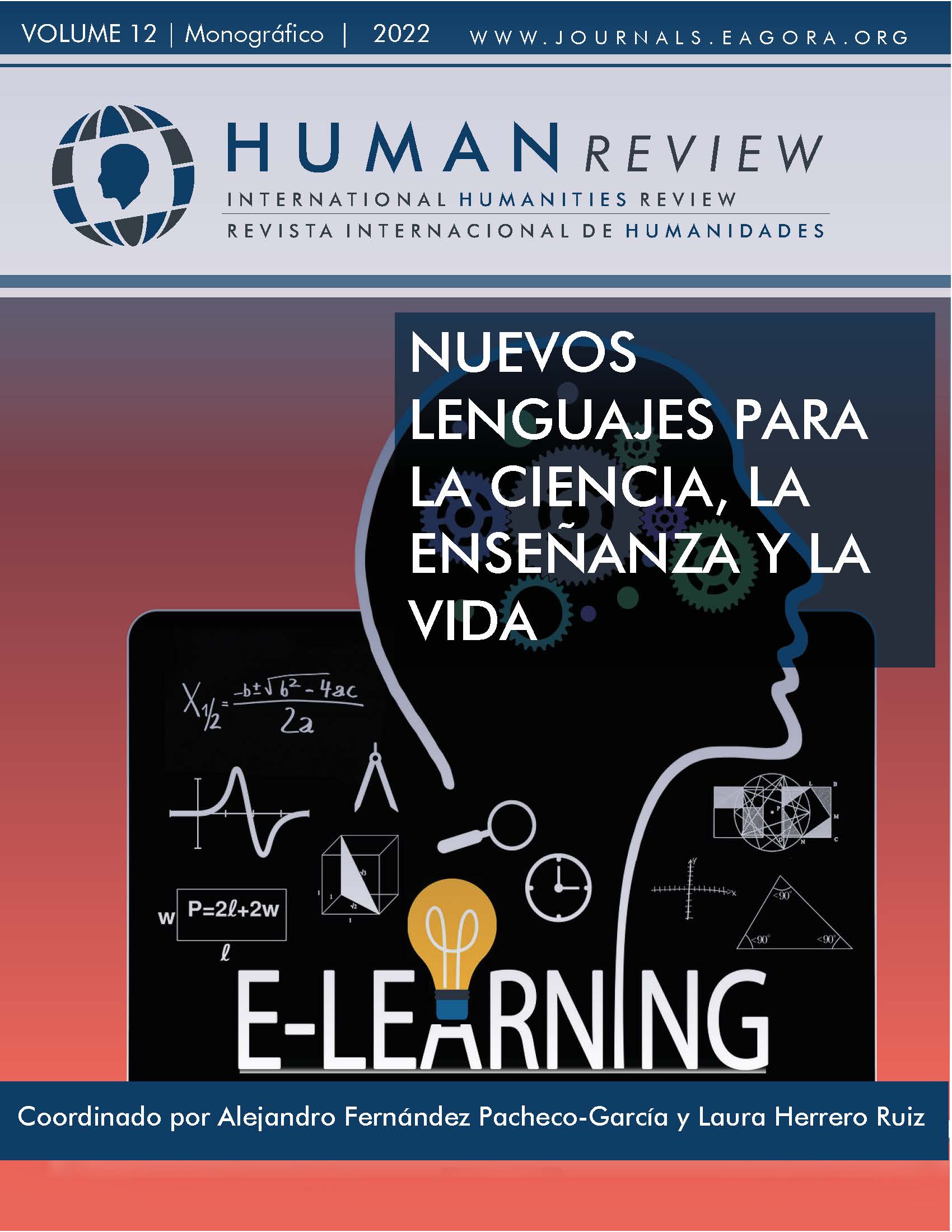Use of reusable audiovisual elements as means to improve learning of Mathematics in Engineering
Experience based on teaching mathematics in engineering degrees
DOI:
https://doi.org/10.37467/revhuman.v11.3974Keywords:
Multimedia contents, Reusable learning object, Kaltura, Mathematics, Engineering, Self-learning, E-learningAbstract
After the COVID-19 pandemic, learning content virtualization has been promoted by educational institutions, leading to the development of audiovisual resources to support teaching. These materials often consist of videos of variable duration envisaged as a complement to other training strategies in order to facilitate the acquisition of specific learning contents. This work presents a collaborative experience among teachers for audiovisual content generation, tailored to the specific contents of different math-related basic subjects in five different engineering degrees at the University of Cantabria.
References
Abia Llera, LM., Calvo Cabrero, MP., Cano Urdiales, B. & López Pérez, PM. (2019). Divulgando en píldoras y desarrollando competencias orales y escritas en el alumnado de Cálculo Numérico. En IN-RED 2019. V Congreso de Innovación Educativa y Docencia en Red. Editorial Universitat Politècnica de València. 1447-1461. https://doi.org/10.4995/INRED2019.2019.10339
Arnáiz, V. & Álvarez, S. (2015). Corpus de textos audiovisuales frente a corpus de textos escritos. La traducción de micropíldoras de aprendizaje En Sánchez Nieto, M.T., Álvarez Álvarez, S., Arnáiz-Uzquiza, V., Ortego Antón, M.T., Santamaría Ciordia, L. & Fernández Muñiz, R. (Eds.), Metodologías y aplicaciones en la investigación en traducción e interpretación con corpus. Universidad de Valladolid, España.
Bengoechea, L.B. (2011). Píldoras formativas audiovisuales para el aprendizaje de programación avanzada. En Actas de las Jornadas de Enseñanza Universitaria de la Informática (JENUI), Universidad de Sevilla. http://hdl.handle.net/2099/11989. Último acceso 17 Abr 2020.
Brame, C. J. (2016). Effective Educational Videos: Principles and Guidelines for Maximizing Student Learning from Video Content. CBE—Life Sciences Education 15(4), es6. https://doi.org/10.1187/cbe.16-03-0125
Chen, C. M., & Wu, C. H. (2015). Effects of different video lecture types on sustained attention, emotion, cognitive load, and learning performance. Computers & Education 80, 108–121.
Costley, J., & Lange, C. H. (2017). Video lectures in e-learning: Effects of viewership and media diversity on learning, satisfaction, engagement, interest, and future behavioral intention. Interactive Technology and Smart Education 14, 14–30. https://doi.org/10.1108/ITSE-08-2016-0025
Del Casar Tenorio, M.A. & Herradón Díez, R. (2011). El vídeo didáctico como soporte para un b-learning sostenible. Arbor 187, 237–242. https://doi.org/10.3989/arbor.2011.Extra-3n3151
Guo PJ, Kim J, Robin R (2014). How video production affects student engagement: an empirical study of MOOC videos. L@S’14 Proceedings of the First ACM Conference on Learning at Scale, New York: ACM, 41–50
Ibrahim, M., & Al-Shara, O. (2007). Impact of Interactive Learning on Knowledge Retention. In M. J. Smith & G. Salvendy (Eds.), Human Interface and the Management of Information. Interacting in Information Environments (Vol. 4558, pp. 347–355). Springer Berlin Heidelberg. https://doi.org/10.1007/978-3-540-73354-6_38
Jensen, J.L., Holt, E.A., Sowards, J.B. Odgen, T.H., West R.E.. (2018). Investigating Strategies for Pre-Class Content Learning in a Flipped Classroom. J. Sci. Educ. Technol. 27, 523–535 https://doi.org/10.1007/ s10956-018-9740-6
Lange, C., Costley, J. (2020). Improving online video lectures: learning challenges created by media. Int J Educ Technol High Educ 17, 16. https://doi.org/10.1186/s41239-020-00190-6
Lendínez de la Cruz, Á., González, D.S., Ferrari, M.R. (2017). La producción de audiovisuales en el aula de matemáticas como recurso didáctico. En: Comunicaciones del VII Encuentro del Profesorado de Matemáticas de la Provincia de Sevilla. Junta de Andalucía, Consejería de Educación, Sevilla, España, p. 9. https://bit.ly/3I84IXn. Último acceso: 18 Abril 2020.
Maceiras, R., Cancela, Á. & Goyanes, V. (2010). Aplicación de Nuevas Tecnologías en la Docencia Universitaria. Form. Univ. 3. https://doi.org/10.4067/S0718-50062010000100004
Marcelo García, C. & Estebaranz García, A. (1999). Cultura escolar y cultura profesional: los dilemas del cambio. Educar24, 47-69. https://www.raco.cat/index.php/Educar/article/view/20703. Último acceso 17 Abr 2020
Molnar, A. (2017). Content type and perceived multimedia quality in mobile learning. Multimedia Tools and Applications 76, 21613–21627.
Polsani, P.R. (2003). Use and Abuse of Reusable Learning Objects. Journal of Digital Information 3, 164.
Prieto, A., Barbarroja, J., Álvarez, S., Corell, A. (2021). Eficacia del modelo de aula invertida (flipped classroom) en la enseñanza universitaria: una síntesis de las mejores evidencias. Revista de Educación 391, 149–180. https://doi.org/10.4438/1988-592X-RE-2021-391-476
Prieto, A., Díaz, D., Monserrat, J., Barbarroja, J., (2020). La medición del impacto de las innovaciones metodológicas sobre los resultados de la docencia universitaria. RIECS 5(1). https://doi.org/10.37536/RIECS.2020.5.1.201
Román Gallego, J.A.(2011). Videotutoriales como herramienta de autoaprendizaje para el apoyo a la docencia. Memoria de Proyecto de Innovación. Universidad de Salamanca. URL: http://hdl.handle.net/10366/112716. Último acceso 17 Abr 2020
Ronchetti, M. (2010). Using video lectures to make teaching more interactive. Int. J. Emerg. Technol. Learn. 5, 45–48. https://doi.org/10.3991/ijet.v5i2.1156
Sosa, M.J. & Mendoza A. (2012). El aprendizaje colaborativo en la enseñanza superior a través de la elaboración de contenidos digitales. En Libro de Actas de la Conferencia Ibérica en Innovación de la educación con TIC, Bragança. ISBN: 978-972-745-130-2
Valderrama, J.O., Sánchez, Á. & Urrejola, S. (2009). Colaboración Académica Internacional en Tecnologías de la Información y Docencia Virtual. Form. Univ. 2. https://doi.org/10.4067/S0718-50062009000600002
Zheng, L., Bhagat, K.K., Zhen, Y., Zhang, X. (2020). The Effectiveness of the Flipped Classroom on Students’ Learning Achievement and Learning Motivation: A Meta-Analysis. Educational Technology & Society 23, 1-15
Downloads
Published
How to Cite
Issue
Section
License
Those authors who publish in this journal accept the following terms:
- Authors will keep the moral right of the work and they will transfer the commercial rights.
- After 1 year from publication, the work shall thereafter be open access online on our website, but will retain copyright.
- In the event that the authors wish to assign an Creative Commons (CC) license, they may request it by writing to publishing@eagora.org









